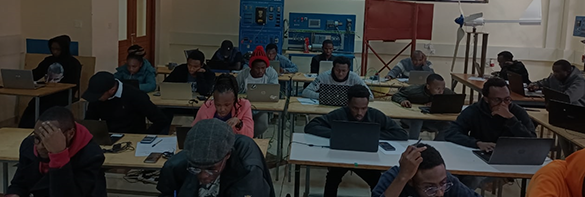

Virtual Reality

Analytical Process Control
This VR digital twin project is based on Amatrol's Analytical Process Control Learning System, which trains learners to control chemical properties of substances, applicable across industries such as pharmaceuticals, food and beverages, and refineries.
Additional Images


Project Details

Compressed Air Energy Process Control System
Compressed Air Energy Process Control System is a Virtual Reality application exploring Energy Sustainability. Its key feature is generating electrical power using a turbine driven by a pneumatic actuator powered by pressurized air.
Additional Images


Project Details

VR-ROS
Robotic systems are now widely used across industries for tasks requiring precision, consistency, or safety. VR-ROS, a cutting-edge VR application, immerses users in the mechanics of articulated robots, equipping them with practical knowledge for robotics-focused workplaces.
Additional Images


Project Details
Virtual Reality: Knowledge Without Bounds Yet So In-Touch
As the country pushes for manufacturing under the Big 4 Agenda, emerging technologies like Virtual Reality (VR) offer immense potential for both industrial efficiency and TVET education. VR offers a novel concept in the field, a new found widespread use in fields like education, entertainment, medicine, and manufacturing. This immersive technology, characterized by synthetic environments and sensory experiences, holds the key to revolutionizing technical training in industrial automation.
Evolution of Virtual Reality
In the 1960s, VR was a theoretical concept. By the 1990s, it became mainstream, largely through entertainment and gaming. Over two decades, it evolved to be applicable in various fields including education and manufacturing, with features like head tracking, body tracking, and stereoscopic views.
VR in Industrial Automation Training
In technical fields, hands-on training is crucial. However, accessibility to physical machines can be limited due to cost and availability, especially in developing countries. VR offers a solution by creating virtual environments that simulate real-world physics and machines. This ensures all students can interact with "virtual machines", avoiding the cost of physical equipment and eliminating the issue of spectating.
Digital Twin and Virtual Reality
VR enhances the use of Digital Twins, digital replicas of physical systems running in real-time. DTs, commonly used in industrial settings, benefit from VR’s ability to visualize and interact with data more intuitively. VR-DT integration provides a seamless way to control machines in both virtual and physical environments, improving analysis and operations.
The Virtual Machine Control (VMC) Lab at DeKUT
At Dedan Kimathi University of Technology, the Virtual Machine Control Lab has been exploring VR and Digital Twin technologies for over three years. Their research has led to the development of a Virtual Laboratory, aimed at delivering world-class training in Industrial Automation. Starting with Digital Twin applications in geothermal drilling and elevator security systems, the lab envisions a future where students worldwide can access high-quality training in mechatronic systems without physical constraints.